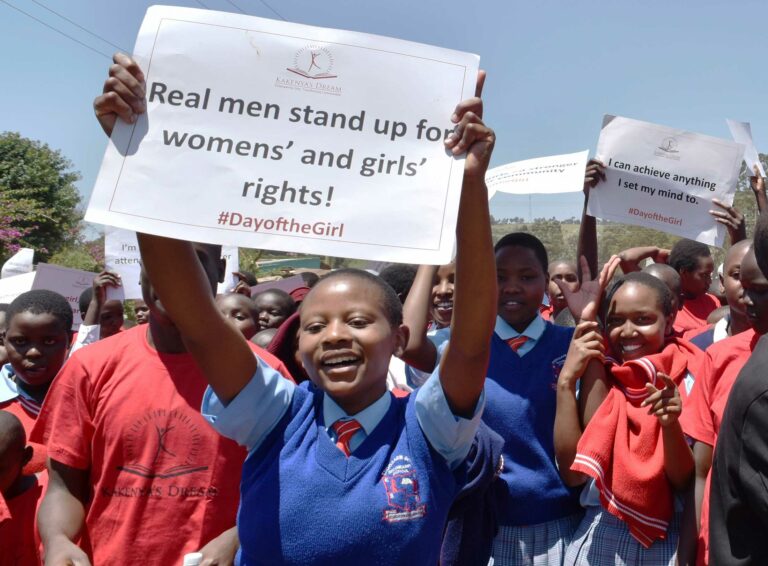Our work at Kakenya’s Dream doesn’t happen in a vacuum. We rely on allies across place and sector to advance our mission. Research shows that 96% of organizations that engage male allies make measurable progress toward their goals for gender inclusion. Allyship is essential to achieving gender equality and we want to encourage everyone to join our efforts. Wherever you are, however you identify, you can contribute to women’s empowerment! Here are some ideas to get you started.
1. Educate yourself on women’s issues
Start by learning how gender disparities harm not only women, but our collective future. Womens’ potential for positive changemaking is limited by social, political, and economic barriers. For example, the UN reports that women earn 23% less than men globally, they face increased vulnerability to sexual violence and exploitation, and they shoulder a greater burden of unpaid care and domestic labor. While it is important to remember that context shapes women’s experiences, these examples illuminate how gender disparities impact women everywhere. Understanding and learning more about these disparities helps us better protect women’s rights, and we begin to create a more just and peaceful world for all.
2. Listen to women’s ideas and input
Be a listener. Actively seek out and internalize feedback from women in your family, workplace, community, and society at large. Women’s perspectives and experiences are devalued when they are overlooked and not truly heard.
Listen not just to respond but to understand. By listening with intention and care, you can honor women’s thoughts, creativity, and problem solving. We’ve seen how this has led to monumental inventions ranging from cancer treatments to life rafts to car heaters. Who knows what women will invent in the future if given the opportunity, so give them the opportunity.
3. Create inclusive workplaces
According to the World Bank, in 86 countries around the world women face a form of job restriction, and 95 countries do not guarantee equal pay for equal work. Gender prejudice in the workplace undermines women’s success and reduces overall productivity. At work, and in any conversation or setting in general, it is essential to foster a culture of respect and inclusion. Take note of who is or is not in the room. If there isn’t a representative balance of genders and identities, then diversify.
4. Show appreciation toward women and credit their achievements
Women’s and girls’ success must never be discounted. It’s important to acknowledge and memorialize women’s accomplishments to combat systematic practices of erasure and nonrecognition. Erasure, in which women’s – particularly black women’s – labor and contributions are made invisible, is a global problem. Women, nor should anyone else, have their achievements be written out of collective memory. Start by honoring the women in your life. Recognize their efforts and always give credit where it is due.

5. Advocate for women’s rights
Advocacy comes in many forms – even conversations at the dinner table. Initiate honest dialogues with coworkers, peers, and family members about how you practice gender inclusiveness. Ask women what you can do to make distribution of labor and decision making processes in your household or workplace more equitable. Remember to center women’s ideas and experiences in your approach. When you observe sexist behaviors or violence against women, do not normalize it and hold others accountable.
6. Encourage girls and women to pursue and occupy positions of leadership
Women must participate in any decisions that will impact them. Let’s be honest, that is nearly everything, yet women represent less than 25% of parliamentarians globally. More women must be incorporated into positions of power and authority.
Help promote women’s leadership in governance, business and civil society. Everyone will benefit. Studies show that “increasing women’s participation in politics leads to greater investments in education and health.” Furthermore, companies with strong female leadership experience nearly 3% greater returns on equity annually compared to companies without.
7. Protect girls’ access to basic rights and needs
Far too many girls around the world face catastrophic threats to their basic human rights. Every year, 12 million girls become child brides – that’s over 32,000 girls every day whose childhoods are stolen. Additionally, over 200 million girls and women alive today have undergone female genital mutilation (FGM). These harmful cultural practices undermine girls’ health and access to education and economic empowerment. This month, the UN put out an urgent call for greater investment in girl-centered development programming. Contribute now to organizations that address girls empowerment.
8. Support women’s empowerment organizations
Finally, mobilize and join causes for women’s empowerment. Organize a fundraiser or volunteer your time. Join our efforts at Kakenya’s Dream to end harmful cultural practices and empower girls in Kenya to become powerful agents of change today.

